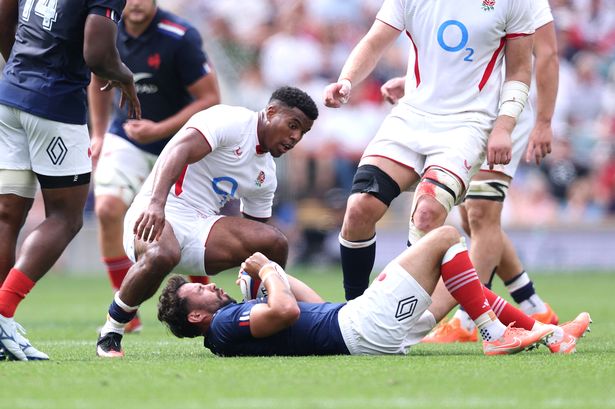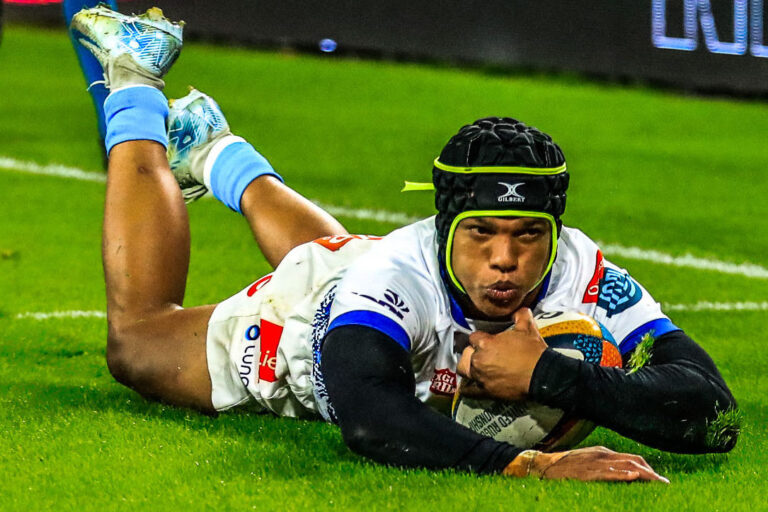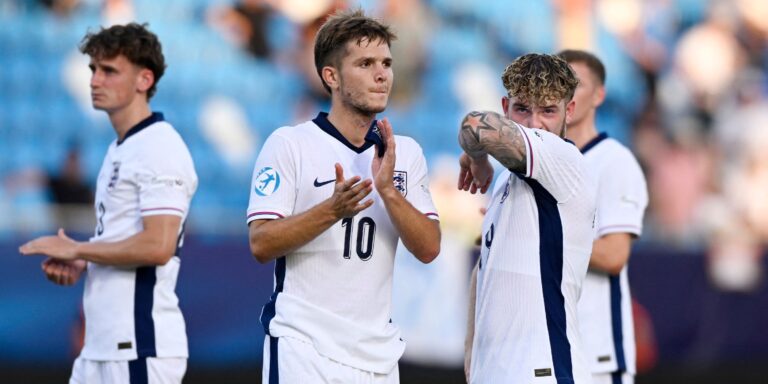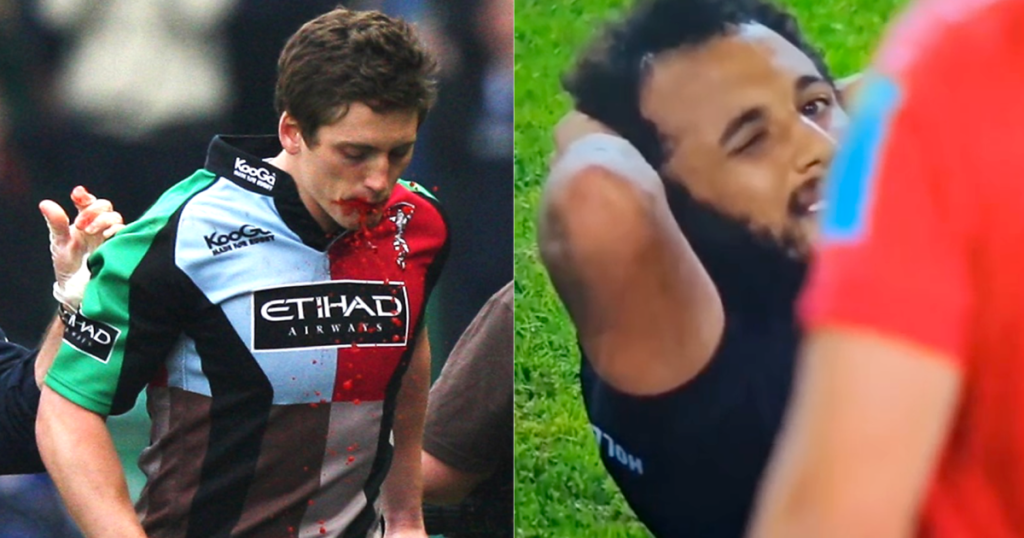
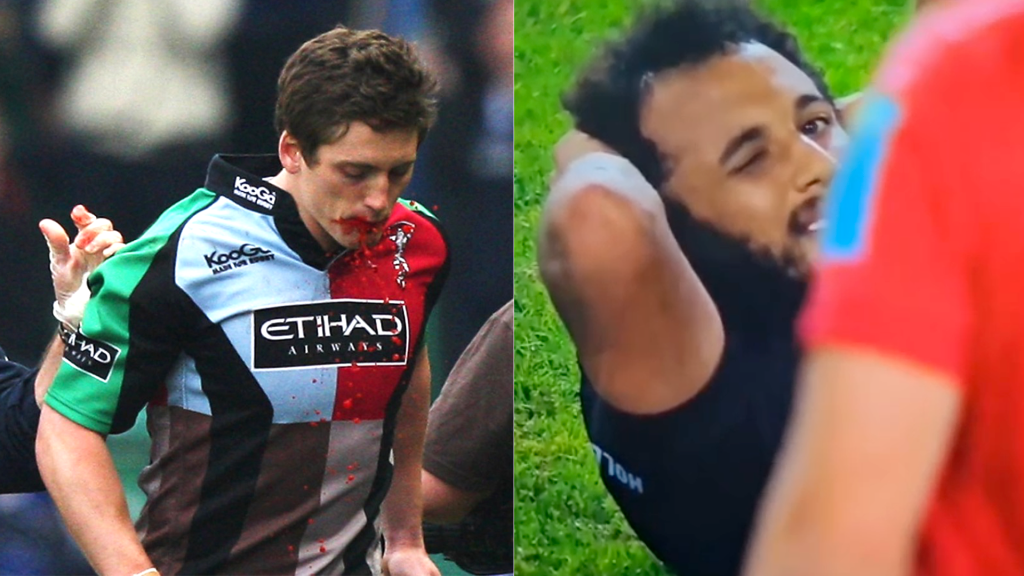
Jaden Hendrikse’s wink has been branded rugby’s most controversial eye-flutter since Tom Williams’s fake blood-soaked face made front-page news 16 years ago. So, let’s compare the two cases.
Exhibit A: ‘Bloodgate’, 12 April 2009, The Stoop, London.
In the dying minutes of a Heineken Cup quarter-final against Leinster, Harlequins’ replacement winger Tom Williams bit into a fake blood capsule. This theatrical gesture, allegedly ordered by director of rugby Dean Richards, was designed to engineer a tactical substitution. The goal? To bring back Nick Evans, a key playmaker who had already been replaced. Williams, who winked at teammates as he exited the field, later had his lip cut open by a physiotherapist in the changing room to sell the ruse.
Exhibit B: ‘Crampgate’, 31 May 2025, Kings Park Stadium, Durban.
Fast forward to this year’s United Rugby Championship quarter-final between the Sharks and Munster. As the match edged into a kicking shootout, deadlocked at 24-24 after extra time, Jaden Hendrikse, the Sharks’ starting scrum-half, went down with cramp shortly after slotting his second kick. As he lay receiving treatment, Munster fly-half Jack Crowley, who was next up to kick, expressed frustration at the delay. Hendrikse responded with a wink.
Aside from involving eyelids, these two incidents have virtually nothing in common. And placing them side-by-side exposes a fundamental flaw in how we often talk about rugby: the confusion between illegality, unsportsmanlike conduct, and the subjective bounds of acceptable behaviour in a competitive arena.
Here’s the key distinction: one act broke the laws of the game. The other did not.
Faking an injury to manipulate substitutions after all permitted changes have been made -as happened in Bloodgate – is explicitly illegal under World Rugby’s laws. In contrast, appearing to exaggerate or play up a cramp (and let’s be clear, Hendrikse’s cramped calf was visibly spasming on replay) is not. There’s no law against winking.
However, if we’re going to dissect intent and ethics, there are two laws worth mentioning.
Law 9.27: “A player must not do anything that is against the spirit of good sportsmanship.”This is a broad clause, often cited in cases of psychological gamesmanship. Think of Joe Marler or Amy Cokayne theatrically counting to five while waiting for an opposing scrum-half to play the ball. Cheeky? Yes. Annoying? Absolutely. Illegal? Not at all.
Law 9.7(c): “A player must not do anything that may lead match officials to consider that an opponent has committed an infringement.” This one aims to crack down on simulation or theatrics in the hope of winning a penalty. Stuart Hogg’s infamous flop in the 2015 World Cup against South Africa springs to mind. Referee Nigel Owens’s iconic response – “Come back in two weeks and play,” referencing football’s tenancy at the same venue – perfectly captured rugby’s squeamishness around feigned behaviour and self-righteousness in contrast to other sports.
Rugby’s holier-than-thou self-image has long been a source of internal tension. The belief that rugby is above the kind of play-acting that’s commonplace in football is both arrogant and demonstrably false. The game is filled with grey areas, acts of cunning, and moments that dance on the edge of acceptability.
And yet, the uproar over Hendrikse’s wink, as though he gouged someone’s eye or landed a haymaker, feels like a classic case of rugby’s moral panic. It’s performative outrage. And it’s tiring.
So, can we stop pretending there’s a universal code of right and wrong that exists outside the actual laws of the game?
World Rugby’s law book is 21 laws long, with several sub-clauses in each. It’s not perfect, but it’s pretty comprehensive. If something doesn’t break a law, then debate it by all means. But don’t act as if moral consensus is mandatory.
Yes, fans are entitled to be annoyed. Get worked up. Build rivalries. Stick a printout of your least favourite player on the dartboard. Grudges are healthy. Needle sells tickets. But don’t mistake personal offence for collective outrage.
Take Peter O’Mahony’s barb at Sam Cane in 2022, calling him a “sh*t Richie McCaw.” Was that respectful? Sportsmanlike? Depends on your colours. That’s the point: offence is in the winking eye of the beholder.
Irish fans and pundits have led the outcry against Hendrikse, stoking a blossoming rivalry with South Africa that has only intensified since the Springboks ended Ireland’s World Cup dreams in 2023. I love it. Bring it on.
Hendrikse in Dublin later this year? Inject it into my veins. Imagine the build-up. The pressers mid-week. The spicy podcast takes. We always hear that rugby needs more marketable characters, more edge, more emotion. And now here we are, clutching our pearls over a wink. For a game that requires immense bravery it sure has a lot of snowflakes.
That wink shows people care. And that’s something the game should celebrate, not scold.
